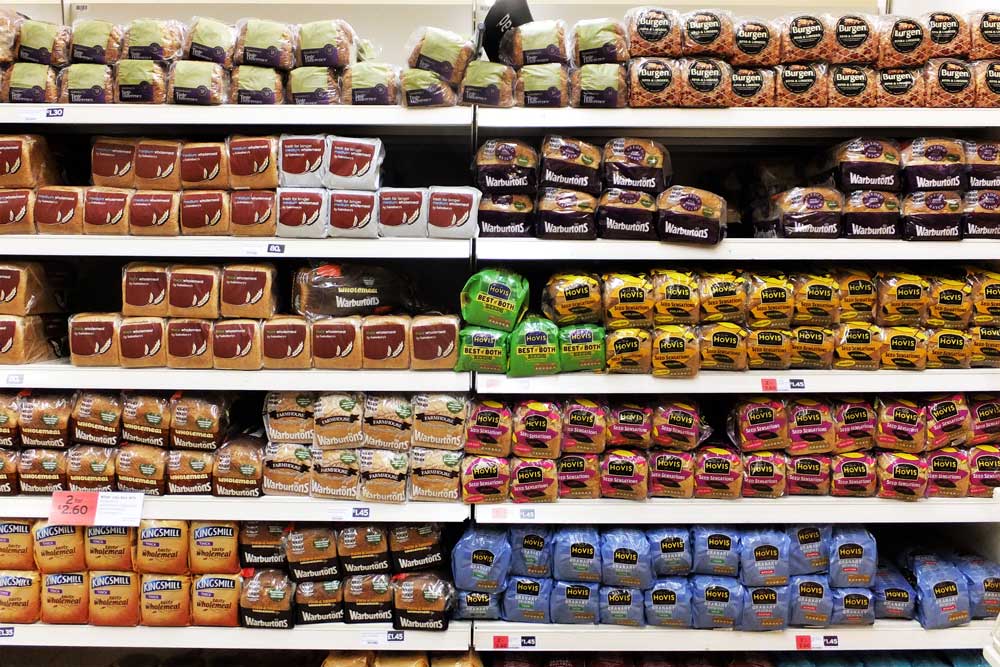Sustain / Real Bread Campaign / Archive
Supermarkets

Just how much of this is what the Campaign calls Real Bread and what hidden costs might lie behind low prices at the till?
- Loaves in supermarkets
- Wrapped sliced loaves
- In store 'bakery' loaves
- Why is it better to buy from a Real Bread bakery?
See also
- Which brands of wrapped loaves are Real Bread?
- What about the high street chain 'bakeries', sandwich shops etc?
- Notes on the Chorleywood 'Bread' Process
- Many pappy returns (well, one)
- Supermarket 'sourdough'?
- ASA ruling: Tesco
- ASA ruling: Hovis
- ASA ruling: Allinson
The Real Bread Campaign's 2010 report Are Supermarket Bloomer Pants? is available here.
Loaves in supermarkets
Loaves sold by supermarket chains broadly fall into two categories: wrapped sliced and in-store bakery.
Wrapped sliced loaves
These loaves, most commonly square, sandwich tin shaped, are almost all made by the Chorleywood 'Bread' Process. Named after the Hertfordshire town of its creator, the British Baking Industries Research Association (BBIRA) , CBP was launched in July 1961.
CBP replaces dough's natural 'ripening' time with high-speed mixing and a cocktail of oxidising agents, emulsifiers and other artificial additives (and, increasingly, hidden processing aids), higher levels of yeast than generally found in Real Bread making, hard fats (such as palm fat, the sustainability of its origin possibly questionable), and often a lacing of preservatives to delay the growth of mould. The process also requires the input of extra energy to control the dough temperature, which has been heated by the energy intensive mixing, and to cool the loaves before wrapping.
Statistics from market research companies Mintel, Kantar Worldpanel and Nielsen, and the Federation of Bakers and FAB Flour (organisations mainly representing Big Baking and Big Milling businesses) vary, but its seems that between about 9 and 12 million wrapped loaves are sold in the UK every day, variously stated to be upwards of about 75% of the loaves we buy.
According to IBIS World's August 2013 Bread & Bakery Goods Production in the UK report, even though there are more than 1,600 bakery businesses in the UK, there is a very uneven distribution of income, with just four companies taking more than 55% of sales.
In September 2013, the author of Mintel's Bread and Baked Goods - UK - September 2013 was quoted by The Guardian as saying the amount of wrapped sliced loaves being eaten in the UK eating had fallen by almost 8% to 1,372 million kg since 2008. She also estimated that loaf sales had fallen by an average of 2-3% every year since the end of the Second World War.
Branded and own brand
Wrapped sliced loaves are sold either under the supermarket's own name (though not necessarily made by the chain itself) or under the brand of other companies.
What is the difference between these loaves that accounts for the wide variation in price? In late 2013, for example, the cheapest own-brand 800g 'value' loaves retailed at about 50p, with the own-brand 'standard' range at around 85p - £1 and the 'premium' range and branded loaves coming in at anywhere from about £1.30 to £1.50.
- What on earth is the justification for the price of this third category being around 300% that of the 'value' range?
- Are the loaves made by a different process? No - they are CBP loaves.
- Are more people involved in their manufacture or are they made in smaller batches? It seems highly unlikely that economies of scale enter the equation.
- Is there any appreciable difference in the price of ingredients used? Little if any: unless clearly labelled as being made from stoneground flour, CBP loaves are made using roller-milled flour from large mills.
In-store bakery loaves
As above, figures are inconsistent, but in-store 'bakery' loaves account for around 15-17% of those we buy in the UK.
How many of these 'bakeries' actually employ local people opportunities to become skilled bakers and make loaves from scratch, using only natural ingredients - i.e the way they are made in a Real Bread bakery - is uncertain.
The 2009/10 Real Bread Campaign investigation of six major UK supermarket chains found that many supermarket in-store 'bakeries' did not in fact make every loaf fresh from scratch on-site, instead using the bake-off process of merely reheating part-baked loaves produced elsewhere in their 'loaf tanning salons,' as we dubbed them.
According to an article in British Baker magazine, bake-off production: ‘…demands around twice the energy of conventional breadmaking...’ Despite this, as in-store bakeries are classed as primary production sites, they qualify for financial incentives from government, paid for by taxpayers, through lucrative Climate Change Agreements.
Additionally, of the six chains, only Marks & Spencer advised us that any of its in-store bakery loaves (and even then, only a handful of lines) met the very simple Real Bread criterion of being made without the use of processing aids or any other artificial additives.
The Real Bread Campaign believes that people have the right to know just how in-store bakery loaves are being produced. Without this knowledge, how can we make fully informed choices between purchasing them or opting for Real Bread from local independent bakeries or our own ovens?
Due to current labelling law, customers are denied the right of knowing what additives or processing aids have been used in the production of in-store 'bakery' loaves, and whether they have been baked from scratch unless they ask. It seems, however, that the UK implementation of the new EU Food Information for Consumers Regulation could change at least some of this.
You can download our Are Supermarket Bloomers Pants? report here.
Why is it better to buy from a Real Bread bakery?
The Real Bread Campaign believes there are a number of reasons that it is better to buy Real Bread (by which we simply mean made without artificial additives - a universally accessible starting point) from small, local, independent bakeries. They include:
The chance to eat all-natural, additive-free food
Sure, all artificial additives in use are declared safe, but history is littered with such assurances that were later withdrawn when substances were found to be perhaps not so safe after all. Could it be the cocktail of artificial additives and hidden processing aids used to produce industrial loaves that has led to an apparent increase in the number of people reporting difficulty eating them?
The Real Bread Campaign calls for money to be invested in thorough research so we know one way or the other.
Remember - a supermarket loaf being sold unwrapped does not offer you any guarantee that it is additive-free.
More jobs per loaf
A small, independent bakery offers meaningful, skilled baking jobs to people from YOUR local community. Very simply put, each time you buy from one, you are helping to support more jobs per loaf.
Supporting your high street
As well as supporting meaningful jobs for local people, each time you spend money with locally-owned businesses, far more of that is likely to be reinvested locally. Where would you rather see your money go - supporting your neighbours and keeping your high street alive, or lining the pockets of the shareholders of huge national - or even multinational - corporations?
Spreading the love
While supermarket loaves are generally made using ingredients (and often addtives) from large corporations, you might well find that a local Real Bread bakery buys theirs from other, smaller, independently-owned businesses.
Time and care
A CBP loaf takes around 90 minutes to manufacture, eliminating the time dough needs to ferment naturally. An in-store 'bakery' loaf might not have taken too much longer - unless you include the second baking many supposedly 'fresh' loaves receive. Compare this to the hours that Real Bread bakers invest in each batch of loaves, particularly genuine sourdough.
The cost of this speeding up? Well, apart from the additives and so on (see above), cutting time out of the process means that dough is not allowed to 'ripen'. Think of the problems that eating a green tomato would cause you. Could a loaf made from 'unripe' dough also give some people difficulty? Might those same people find they can enjoy genuine sourdough, or other longer-fermented Real Bread?
Again, the Real Bread Campaign calls for money to be invested in thorough research. For now, see the notes on longer fermentation on our FAQs page.
Taste
As taste is totally subjective, it's something we don't often mention. But another thing that the industrial loaf process does is rob loaves of time to develop flavour. Similar to cheese, wine, fruit and other foods, bread dough benefits from having time to allow natural processes that generate flavour compounds, which enhance the taste and smell of loaves.
Having taken this away, industrial loaf manufacturers may resort to tactics including adding flavour enhancers such as vinegar or extra salt, or you might even see 'bread flavouring' listed!
Real Bread Campaign: The Real Bread Campaign finds and shares ways to make bread better for us, better for our communities and better for the planet. Whether your interest is local food, community-focussed small enterprises, honest labelling, therapeutic baking, or simply tasty toast, everyone is invited to become a Campaign supporter.


